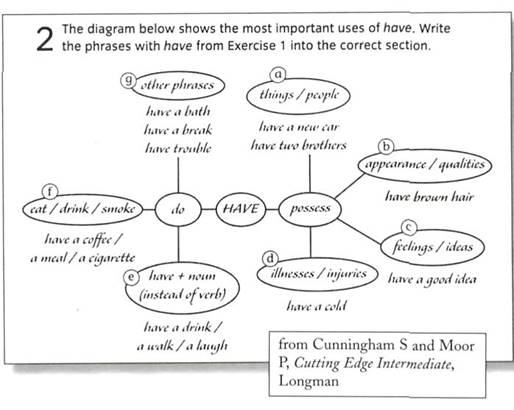Дипломная работа: Studies lexical material of English
If you ... imperative ...
If you ... you have got to ...
If you ... then I'll...
• Write some more examples, using these patterns, that would fit the theme of the song.
• Use examples from the song to show the difference between tell and say.
Here are some more ideas for teaching collocation:
Learners sort words on cards into their collocational pairs (e.g. warm + welcome, slim + chance, golden + opportunity, lucky + break, mixed + reception, etc). Use the same cards to play pelmanism. Or they sort them into binomial pairs (pairs of words that follow a fixed sequence and often have idiomatic meaning such as hot and cold, to and fro, out and about, sick and tired). Or into groups, according to whether they collocate with particular 'headwords': e.g. trip (business, day, round, return, boat), holiday (summer, family, public, one month, working) and weekend (long, every, last, next, holiday). Follow up by asking learners to write sentences using these combinations.
Read out a list of words: learners in groups think of as many collocations or related expressions as they can. The group with the most collocations wins a point. Good words for this include parts of the body (face, head, back, foot, hand), colours (red, green, blue, black, etc.) and opposites, such as weak/strong, narrow/wide, safe/dangerous, old/young, etc.
Fill in a collocational grid, using dictionaries, to show common collocations. For example, here's a very simple (and completed) one for wide and broad.
| wide | broad | |
| • | door | |
| • | • | street |
| • | • | river |
| • | smile | |
| • | shoulders | |
| • | nose | |
| • | ga P | |
| • | accent | |
| • | world | |
| • | • | range |
| • | variety | |
| • | apart | |
| • | awake |
Ask learners to prepare 'collocation maps' of high frequency words and their collocates. Words like have, take, give, make and get lend themselves to this kind of treatment. They are often used in combination with nouns to form an expression which has a meaning of its own, as in have a look, take a break, give advice, make an appointment, so that the verb itself has little or no independent meaning. For this reason, they are called delexical verbs. Here, for example, is a collocation map for have, which shows its range of collocations organised into meaning categories:

Learners can either create their own maps using dictionaries or add to an existing map, as this task (also from Cutting Edge Intermediate) suggests:

Because of the two-part nature of collocations, any matching activities lend themselves to work on them. Similarly, odd one out tasks are useful. For example:

Finally, as a general approach to the teaching of lexical phrases and collocation, the following advice is sound:
- Become more aware of phrases and collocations yourself.
- Make your students aware of phrases and collocations.
- Keep an eye on usefulness and be aware of overloading students.
- Feed in phrases on a 'little but often' basis.
- Introduce phrases in context, but drill them as short chunks.
- Point out patterns in phrases.
- Be ready to answer students' questions briefly.
- Keep written records of phrases as phrases.
- Reinforce and recycle the phrases as much as you can.
(from Cutting Edge Intermediate Teachers' Book, Longman)
4.4 Teaching phrasal verbs
Phrasal verbs are another instance of the fuzziness at the boundary between words and grammar. They are particularly problematic for learners both because of their lexical meanings (which are often idiomatic) and their grammatical form. Here is how phrasal verbs are often grouped, according to their grammar:
2 There are four types of phrasal verb.
Type 1: intransitive e.g. come to (recover consciousness) These don't take an object.
Type 2: transitive inseparable e.g. look into (investigate) These must take an object which always comes after the verb.
Type 3: transitive separable e.g. put off (postpone) The object can either come between the verb and the particle or after the verb. If we use a pronoun then it must go between.
Type 4: three-part, e.g. put up with (endure) These are always transitive inseparable.